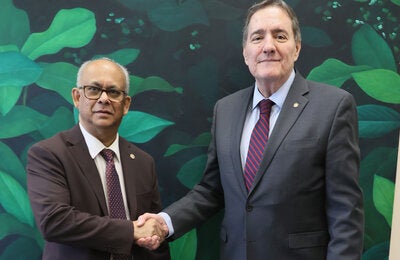
Washington DC, 3 November, 2020 (PAHO/WHO) - With more than nine hundred people enrolled, the Pan American Health Organization (PAHO) launched the course for the implementation and strengthening of Programs for Optimizing Antimicrobials (PROA, in Spanish), aimed at leaders, managers and health professionals who develop tasks related to the use of antimicrobials in health institutions.
The course, which is hosted on the PAHO Virtual Campus of Public Health, began on Monday, 2 November, after a call for application in which more than one thousand people applied. It is scheduled over a 7 weeks course, requiring approximately 70 hours of involvement.
The educational offer seeks to provide the necessary tools for the programming, execution, and monitoring of the activities implemented to optimize the use of antimicrobials, to the health professionals involved with the Programs for Optimizing Antimicrobials.
The course is composed of five modules that address the problem of antimicrobial resistance; the importance of PROA programs; their organization and implementation; strategies to improve the use of antimicrobials; the essential role of education, interaction, and complement with infection control programs; and other key aspects that will allow professionals to be placed in these processes to improve the quality of care.
At the end of the course, participants will understand the global problem of antimicrobial resistance, its impact, and conditioning factors. They will be able to organize, implement, and monitor the development of a PROA in their health institution and interpret the factors that influence behavior related to antimicrobial prescription. Finally, they will know the contents and appropriate methodologies for training third parties involved in the prescription and dispensing of antimicrobials.
Professionals from 19 countries of the Region participate in the course: Argentina, Bolivia, Brazil, Chile, Colombia, Costa Rica, Cuba, Dominican Republic, Ecuador, El Salvador, Guatemala, Mexico, Nicaragua, Panama, Peru, Puerto Rico, Paraguay, Uruguay, and Venezuela.
The initiative is part of the project “Working together to combat Antimicrobial Resistance” under the “One Health” approach, which is developed under the leadership of PAHO/WHO, in close collaboration with the United Nations Organization for the Food and Agriculture (FAO), the World Organization for Animal Health (OIE) and funding from the European Union (EU).
The objective of the three-year project (2020-2022) is to contribute to fighting antimicrobial resistance by supporting the countries Argentina, Brazil, Chile, Colombia, Paraguay, Peru, and Uruguay in the implementation of their National Action Plans.



